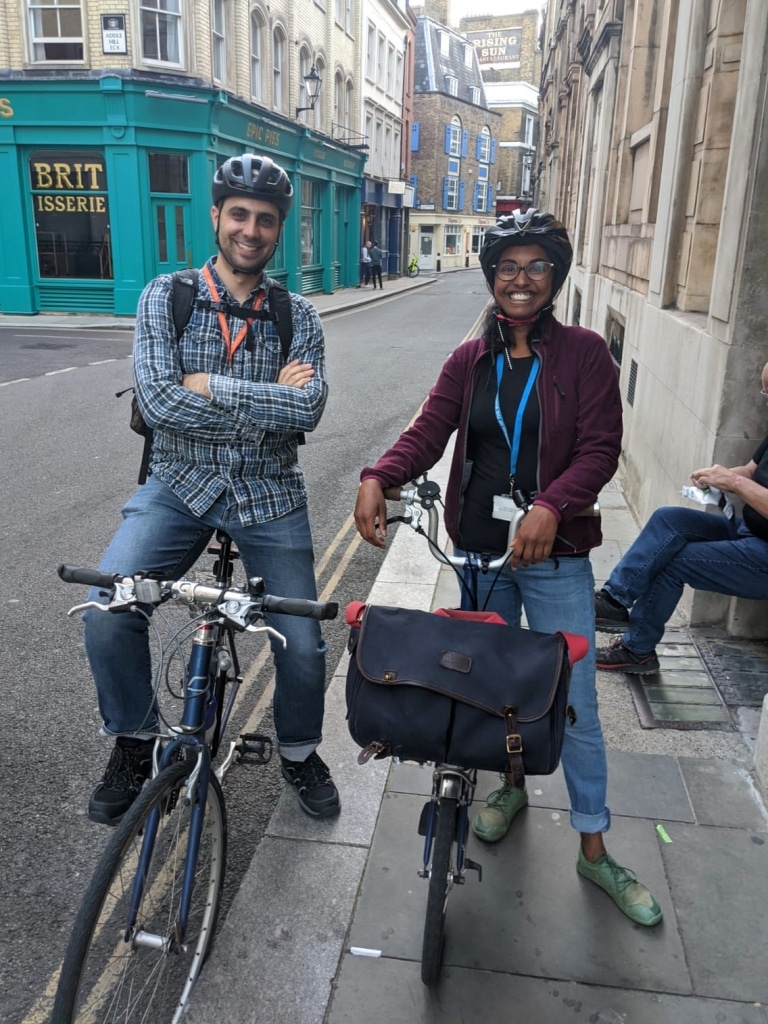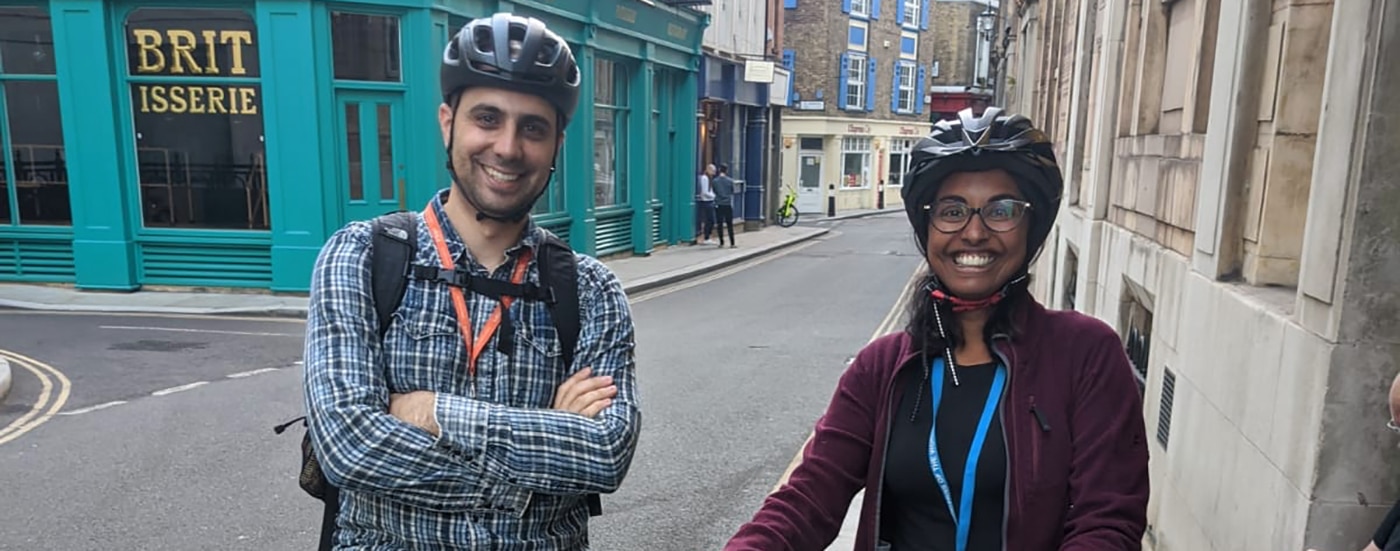Part 1: How I’m helping rough sleepers in London access healthcare
Published 14th August 2020
Doctors of the World UK (DOTW) is working to improve rough sleepers’ access to healthcare in the City of London.
We have secured new funding from the City of London Corporation to run weekly outreach sessions until July 2021, in partnership with homeless charity St Mungo’s.
The service is being led by our mobile clinic coordinator Dr Durga Sivasathiaseelan and follows a successful six-month pilot project.
Durga shares her experience returning to the streets of London to support this vulnerable population.
The city feels like it’s changed. Pubs, bars and restaurants are open again, and everyone is hanging outside drinking and eating.
There’s much more of a presence of people in the city that just didn’t exist six weeks ago when lockdown restrictions were still in place and we were finishing our pilot project.
The emptiness and quietness just aren’t there.
We begin the outreach session at a hostel that has been housing rough sleepers during the pandemic. It initially had 30 beds but has been expanded to accommodate more people as other hotels have closed.
“It’s heart-breaking to see anybody have to sleep on the street. The comfort of a bed is something that we all take for granted because we have it.”
We ask the staff if there are any health concerns at the hostel and there is – a man with bad tooth pain. He’s in so much pain that he can’t eat.
The man already has a medical appointment arranged for the next day but is not on universal credit (benefits), so I help him to complete an online form so that he can access free dental care. He seems surprised this is even a possibility; he’s obviously had bad teeth for some time and has just thought ‘I can’t afford dental care’.
I explain how, in the long term, being on universal credit will help him not only with dental treatment but also with prescriptions. He is very happy about that as well and seems grateful for any help because he’s just feeling so sorry for himself with the amount of pain he’s in.
Doctors of the World often helps people apply for a certificate to get free dental care, prescriptions, and eye tests. It’s not something I normally do on outreach because most rough sleepers are already exempt from charges, but it feels like a nice, practical way to start the session.
Rough sleeping on the rise
Eddie, the outreach coordinator from St Mungo’s, and I leave the hotel and start making our way around the streets of London.
St Mungo’s is a homeless charity we’ve partnered with to deliver medical outreach to rough sleepers in the City of London. People experiencing homelessness are often in poorer health than the general population but struggle to access healthcare, which is where Doctors of the World can help.

Eddie tells me that, particularly in the last four weeks, there’s been a noticeable increase in the number of rough sleepers they’ve been coming across. These are usually either completely new people who are unknown to the system or people who’ve previously been picked up as rough sleepers somewhere else in London and are now in the city.
This is concerning but sadly not surprising.
At the start of the pandemic, when I was working closely with a hotel temporarily housing rough sleepers, there were people being admitted who were newly homeless. People who were living with their employer, or who had cash in hand employment, which had gone instantly when the UK went into lockdown, meaning they could no longer hold onto accommodation.
It was a comfort to know that some of them never had to actually rough sleep, that they could transition straight from the accommodation they’d been thrown out of into the hotel. There were some people who’d had to spend one or two nights as rough sleepers – never having had to do that before – before they were picked up to come into emergency accommodation.
It’s heart-breaking to see anybody have to sleep on the street. The comfort of a bed is something that we all take for granted because we have it, the comfort that you can come inside to somewhere that’s safe.
I camp quite a bit and even though camping isn’t the same thing because I feel I do it in a safe space, there is a level of discomfort that comes with sleeping in a tent. The thought that there are some people who sleep in that level of discomfort, in an unsafe space, all the time… I can’t even imagine what that feels like, but it has to cause some trauma that affects who they are and how they are.
I can, as a result, I think start to understand the distrust so many rough sleepers have towards people and organisations that are offering them help. They have to be extra cautious and extra careful because they’re the only ones who, for so long, have looked out for themselves.
The couple living in a tent
The first rough sleepers we come across is a couple living in a tent. They both have medical issues.
The man, who’s his 40s, has COPD (chronic obstructive pulmonary disease), which is a chronic lung condition. That means he’s one of the people who ideally when there was shielding, should have shielded during COVID-19. But he didn’t want to go into accommodation, he found it very restrictive, so he stayed out on the streets.
He was involved in a fight a few days ago and has two wounds on his knee, which he has been trying to look after but are still a bit irritated. I give him some cleaning wipes and some dressings and ask him to clean and redress it every day to try and speed up the healing process.
“I ask everyone we see on outreach… Have you had a high temperature or a new, continuous cough? Has your sense of smell or taste changed at all?”
His partner has mental health issues as well as asthma, but she isn’t registered with a GP in London. We talk to her about the importance of being registered with a GP and explain that they will be able to prescribe her medication for her asthma if she needs it and that it won’t matter if she doesn’t have a fixed address – she says these are the kinds of things that put her off going to a doctor.
She also thinks that because of COVID-19, GPs won’t be seeing anybody, so they won’t be able to help her. I explain that because she has a mobile phone, the practice will be able to call her and potentially deal with her issues over the phone and arrange prescriptions that she can go and pick up.
Her partner says he will go with her to his GP practice the day afterward to help her to register. Eddie and I will try to visit them again next week so I can check whether she’s managed to register.
Screening for COVID-19
I ask everyone we see on outreach if they have been experiencing COVID-19 symptoms or noticed any changes to their health. Have you had a high temperature or a new, continuous cough? Has your sense of smell or taste changed at all?
In the case of this couple, they don’t have a high temperature and their oxygen levels are good, so I have no concern that they have COVID-19 at this point. We talk about their day to day life and it sounds like the two of them spend their time together – they don’t really mix with other people, so they’re not exposing themselves quite so much.
It’s quite difficult sometimes to make the argument of the benefit of isolating in a hotel room when some rough sleepers are actually isolating themselves. I guess we’re more concerned about the environment and their access to facilities and, if they develop symptoms, what will happen.
That’s something else we discuss with everybody we see on outreach and I raise it with this couple. I explain to them that if they develop any symptoms or feel their asthma or COPD is getting worse for any reason then they should call their GP or NHS111.
If they potentially have COVID-19, then we recommend going into some accommodation temporarily for the time it takes to get tested and if they need to, to isolate for at least 10 days.
